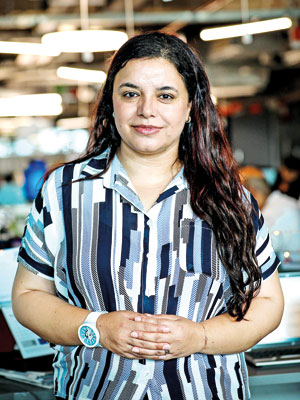Sunday Times 2
MSF Colombo Summit offers window for Lanka to play stronger role in global humanitarian efforts
View(s):By Mimi Alphonsus
Médecins Sans Frontières (MSF), one of the largest humanitarian agencies in the world, will be holding the second edition of its South Asia Health and Humanity Summit in Colombo on Thursday, August 29. The summit attracts medical professionals and civil society activists from around the region.
MSF is a 65,000-strong medical-aid organisation known for being “the last ones to leave” an active armed conflict. They are currently playing a pivotal role in Gaza, both by treating the injured and by being one of the few international eyewitnesses to war crimes Israel is accused of. MSF has been a staunch advocate of a sustainable ceasefire in Gaza, which is experiencing a public health crisis arising from injuries, destroyed healthcare infrastructure, malnutrition, and a lack of sanitation facilities.

MSF South Asia Chief Farhat Mantoo
In an exclusive interview with the Sunday Times, Farhat Mantoo, the head of MSF South Asia, said that their advocacy on Gaza was an essential part of the MSF’s mission. “The first pillar of MSF is to provide medical aid, and the second is to bear witness,” she said. “We made the decision to speak on Gaza at the UN Security Council knowing that we have a team on the ground and knowing how it would be taken by Israel because it is part of our mission.”
MSF has had a long history in Sri Lanka too. MSF South Asia is headquartered in Sri Lanka and has been increasingly stationing people in Colombo this year. Previously, the organisation provided medical support during the war years and the tsunami before exiting three years after the end of the war in 2012.
Its over two decades of presence in Sri Lanka has not been without controversy. The MSF was accused of assisting the Liberation Tigers of Tamil Eelam, whom the Sri Lanka government and several countries had branded as a terrorist organisation. Along with other international NGOs, MSF struggled to get permission from the government to operate in the war-affected northern areas.
Ms. Mantoo said that their experience in Sri Lanka was not the first time one side had accused them of supporting the other, but that they remained neutral and true to their principles. “Wherever we work, we talk to all parties in the conflict,” she said. “We have a no weapons policy. Anyone who enters our health facilities or hospitals, the moment they enter, are patients to us, and we treat them as patients.”
Ms. Mantoo shared that MSF is in difficult situations all around the world due to the nature of their work. “On a daily basis, we have had to look at the trade-offs,” she said. “In some places, our teams have literally negotiated from checkpoint to checkpoint for medical supplies.” She said they make great efforts to remain in a war zone despite the difficulties, out of a belief that populations should not be abandoned.
The Health and Humanity Summit is an extension of MSF’s mission to bear witness. “We want to share our experience with people as well as world leaders and learn from those working in Sri Lanka,” explained Ms. Mantoo. “We see that Sri Lanka has an interest in playing a stronger role in international humanitarian efforts.”
Researchers and aid workers from Spain, India, Afghanistan, Pakistan, and Sri Lanka will be speaking at the summit. They will focus on gender disparities in global health and cover themes of migration and equal access to medication.
MSF believes that the intersection of gender and health is profoundly overlooked. “I keep calling women the invisible majority. They sometimes do not have a say in how interventions, programmes, and policies are devised for them,” she said. From fewer female doctors even in maternity wards to the lack of tailored HIV treatment for women, Ms. Mantoo said the lack of women’s participation in policy had real-life consequences.
After HIV-positive patients struggled to obtain patented medication in the 2000s, equal access also became a priority for MSF. Its successful court case against Johnson & Johnson in India has contributed to loosening the stranglehold patents have had on the availability of medication in the global south. But Mantoo believes that south-to-south cooperation is essential to ensure that medication remains accessible to all.
She shared that the South Asia region will especially have to deal with climate change, shrinking civil society space, and changing dynamics between countries in the region—all issues that will have a widespread impact on health in the region.
MSF hopes that the Colombo summit will develop cooperation regionally and internationally on important global health issues. “Diseases don’t have borders, and neither does [medical] disinformation,” said Ms. Mantoo, “it is an illusion to assume that other parts of the world won’t touch you.”
Sri Lanka’s role then, according to MSF, is to contribute to the creation of favourable public health policies, learning from its own rich experiences.

